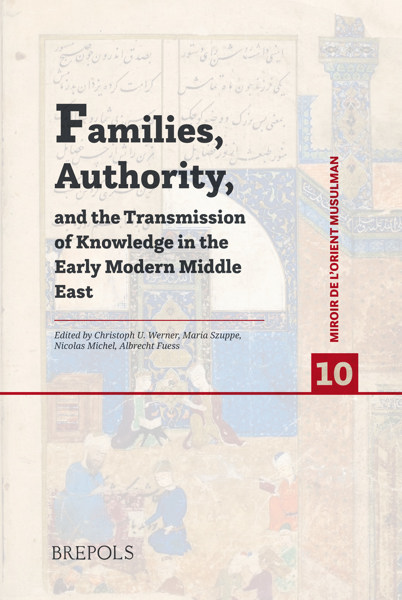Families, authority, and the transmission of knowledge in the early modern Middle East
 This volume brings together innovative contributions on the history and nature of families in the early modern Middle East, covering Central Asia, Iran, Ottoman Turkey and the Arab World from the fifteenth to the seventeenth century and beyond. It argues the importance of connecting the key concept of family in its widest possible meaning, whether descent group, lineage, household or dynasty, with the notion of transmission of knowledge, authority, status and power, and develops this idea through a pluridisciplinary and cross-regional approach. Based on primary sources in Arabic, Persian, and Turkish as well as art and material culture, the individual articles detail processes and dynamics of transmission, thus initiating a comparative dialogue.
This volume brings together innovative contributions on the history and nature of families in the early modern Middle East, covering Central Asia, Iran, Ottoman Turkey and the Arab World from the fifteenth to the seventeenth century and beyond. It argues the importance of connecting the key concept of family in its widest possible meaning, whether descent group, lineage, household or dynasty, with the notion of transmission of knowledge, authority, status and power, and develops this idea through a pluridisciplinary and cross-regional approach. Based on primary sources in Arabic, Persian, and Turkish as well as art and material culture, the individual articles detail processes and dynamics of transmission, thus initiating a comparative dialogue.
zum Buch im KatalogPlus
zum Buch auf der Verlags-Website
Utopian Fiction in China: Genre, Print Culture and Knowledge Formation, 1902–1912
Unlike previous studies that have examined the late Qing utopian imagination as an ahistorical motif, a literary theme, and a translation phenomenon, in this book Shuk Man Leung considers utopian fiction as a knowledge apparatus that helped develop Chinese nationalism and modernity. Based on untapped primary sources in Chinese, English, and Japanese, her research reveals how utopian imagination, blooming after Liang Qichao’s publication of The Future of New China, served as a tool of knowledge formation and dissemination that transformed China’s public sphere and catalysed historical change.
Embracing interdisciplinary approach from genre studies, studies on modern Chinese newspapers and intellectual history, this book provides an analysis of the development of utopian literary practices, epistemic meanings, and fictional narratives and the interactions between traditional and imported knowledge that helped shape the discourse in early 20th century China.
zum Buch im KatalogPlus
zum Buch auf der Verlags-Website
